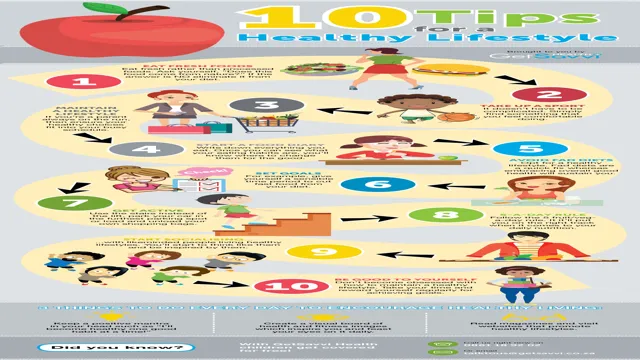As parents, we all want the best for our children, including good health and well-being. However, in today’s fast-paced society, it can be challenging to ensure that our kids are eating well, getting enough exercise, and avoiding unhealthy habits. That’s why we’ve put together a list of ten tips for healthier kids that you can start implementing today.
From healthy eating habits to physical activity and mental wellness, these tips are designed to help your children build healthy, lifelong habits that will serve them well in the years to come. So, why wait? Let’s dive in and start building a healthier future for our kids together!
Eat a Balanced Diet
Healthy eating is crucial for a child’s overall well-being. Encourage your child to eat a balanced diet comprising of proteins, whole grains, fruits, vegetables and healthy fats. Incorporate lean meats, nuts, and seeds as sources of protein.
Fiber-rich whole grains and fresh produce will provide vitamins and minerals necessary for growth, development, and immunity. Avoid processed foods, sugary drinks, and snacks which are unhealthy and have little nutritional value. Instead, provide your child with healthy snacks such as fresh fruits, vegetable sticks, and yogurt.
Make mealtime fun by involving your little one in the meal planning and preparation process. Educate them on the importance of choosing healthy food choices and how it will keep them feeling energized all day long. By teaching them healthy eating habits early on, they are more likely to lead a healthy lifestyle throughout adulthood.
Include fruits and vegetables
To maintain a healthy and balanced diet, it’s important to include a variety of fruits and vegetables in your daily meals. Not only do they provide essential vitamins and nutrients, but they also add flavor, texture, and color to your plate. Eating a rainbow of fruits and vegetables can help reduce the risk of chronic diseases such as cardiovascular disease and some types of cancer.
Try incorporating seasonal produce in your meals, like sweet berries in the summer or root vegetables in the winter. You can also experiment with different preparations, such as grilling, roasting, or sautéing, to keep things interesting. Don’t forget to wash your produce thoroughly and try to choose organic options when possible to reduce exposure to pesticides.
By prioritizing fruits and vegetables in your diet, you’ll be taking a proactive step towards better health and wellbeing.

Limit processed foods
When it comes to maintaining a healthy lifestyle, it’s important to eat a balanced diet. One way to do this is by limiting your intake of processed foods. Not only are these foods often high in calories, but they can also be loaded with artificial ingredients and preservatives that aren’t beneficial for your body.
Instead, focus on incorporating more whole foods into your diet like fresh fruits and vegetables, lean meats, and whole grains. These foods are packed with nutrients and essential vitamins that your body needs to function properly. Not only will a balanced diet help you maintain a healthy weight, but it can also improve your energy levels and overall well-being.
Making small changes to your diet can have a big impact on your health in the long run, so try swapping out processed snacks for fresh fruits or veggies and opting for homemade meals instead of pre-packaged options. Your body will thank you for it!
Stay Active
Physical activity is crucial for children’s overall health and development. Encourage your kids to stay active for at least an hour a day, whether it’s playing outside, joining a sports team, or dancing to their favorite songs. It’s not only fun but also helps build strong bones and muscles, improves balance and coordination, and reduces the risk of obesity and chronic diseases.
As parents, you can be role models by also being physically active and prioritizing family activities that involve movement. Additionally, limit sedentary time spent watching TV or playing video games. Instead, encourage your children to try new activities, set goals, and make physical activity a fun and enjoyable part of their daily routine.
By promoting an active lifestyle, you’re helping your children develop healthy habits that will benefit them throughout their lives.
Encourage outdoor play
Encouraging outdoor play is a great way to stay active and keep kids engaged throughout the day. Whether it’s playing tag, riding bikes, or exploring the neighborhood, outdoor play provides many benefits for children. It allows them to develop their physical abilities, build social skills, and connect with nature.
Plus, it gives them a break from screens and technology, allowing for a healthy balance in their daily routine. So, why not encourage your kids to go outside and play? Find a nearby park or outdoor space where they can run and play, or create an obstacle course in your backyard. And don’t forget to join in on the fun! By modeling an active lifestyle, you’ll inspire your kids to stay active and lead a healthy life.
So, let’s get outside and play!
Limit screen time
One crucial aspect of staying active is limiting screen time. With technology at our fingertips, it’s easy to spend hours scrolling through social media or binge-watching our favorite shows. However, excessive screen time can have negative effects on both our physical and mental health.
Sitting for extended periods can lead to a sedentary lifestyle, which can increase the risk of obesity, heart disease, and other health issues. Likewise, constantly checking our phones or computers can lead to feelings of anxiety and stress. To stay active, consider setting a daily limit on screen time and prioritizing physical activities such as exercise, outdoor recreation, or socializing with friends and family.
Not only will you improve your health and well-being, but you’ll also find that you have more time to engage in meaningful and enjoyable activities.
Get Enough Sleep
One of the most crucial healthy lifestyle tips for kids is getting enough sleep. While it’s easy to overlook, getting enough sleep is just as important as eating right and exercising. During sleep, the body repairs and prepares itself for the next day.
It’s a time of restorative healing that supports overall wellbeing. When kids don’t get enough sleep, it can lead to fatigue, irritability, and difficulty concentrating, which can affect their academic performance and social interactions. As a parent, establish a regular bedtime routine, and ensure that your kid has a comfortable and quiet sleeping environment.
Prevent the use of electronics in the bedroom as they can disrupt sleep patterns. For school-aged kids, aim for nine to 11 hours of sleep per night, while teenagers need between eight to ten hours. By prioritizing sleep, you’re setting up your kid for success in all aspects of life.
Establish a consistent bedtime routine
Getting enough sleep is vital for our overall physical and mental well-being, and one of the key practices for achieving this is establishing a consistent bedtime routine. Having a regular routine before bed can help signal to your body and mind that it’s time to wind down and prepare for sleep. This could involve activities such as taking a warm bath or shower, reading a book, or practicing relaxation techniques such as meditation or deep breathing exercises.
By sticking to a consistent routine every night, your body will start to recognize the pattern and adjust accordingly. You’ll likely find yourself falling asleep faster and waking up feeling more refreshed and energized in the morning. So why not give it a try? Create a simple bedtime routine that works for you and make it a habit.
You may be surprised at how much of a difference it can make in helping you get the restorative sleep your body needs.
Avoid caffeine before bedtime
Getting enough sleep is crucial to our overall well-being, and there are many things we can do to improve the quality of our sleep. One of the simplest things we can do is to avoid caffeine before bedtime. Caffeine is a stimulant that can keep us awake and make it more difficult for us to fall asleep.
Even if we are able to get to sleep, caffeine can affect the quality of our sleep and leave us feeling groggy and tired in the morning. If we want to get a good night’s sleep, it’s important to avoid caffeine for at least a few hours before bedtime. Instead of drinking coffee or tea, we can opt for a decaf version or drink a calming herbal tea like chamomile.
By avoiding caffeine before bed, we can improve the quality of our sleep and wake up feeling refreshed and energized for the day ahead.
Stay Hydrated
One crucial aspect of children’s health is staying hydrated. Drinking enough water is essential for overall health, as it helps with digestion, regulates body temperature, and keeps energy levels up. Encourage your child to drink water throughout the day by providing them with a reusable water bottle and reminding them to take sips regularly.
Additionally, opt for water instead of sugary juice or sodas during mealtimes to reduce the intake of unnecessary sugars. If your child is resistant to drinking water, try adding slices of fruit or cucumber for a flavor boost. Staying hydrated is a simple yet effective way to promote healthy habits in your child’s daily routine.
Encourage drinking water instead of sugary drinks
In today’s busy world, it is essential to stay hydrated to maintain good health. However, with so many sugary drinks available, it can be easy to overlook the importance of drinking water. That’s why it’s important to encourage drinking water instead of sugary drinks.
Not only is water essential for hydration, but it also has numerous health benefits. Water helps to keep our bodies functioning properly by regulating body temperature, aiding in digestion, and flushing out toxins. It is also beneficial for maintaining healthy skin and for weight management.
Drinking sugary drinks, on the other hand, can lead to numerous health issues such as obesity, diabetes, and tooth decay. Therefore, it’s important to make water easily accessible and appealing by carrying a reusable water bottle, adding fruits or herbs for flavor, and reminding ourselves of the benefits of staying hydrated. So let’s make a conscious effort to stay hydrated and encourage others to do the same by drinking water instead of sugary drinks.
Conclusion
As we all know, kids are the future and it’s essential to ensure that they develop healthy habits early on. These 10 healthy lifestyle tips are a great starting point, but they’re not just for kids! Everyone can benefit from eating well, being active, and prioritizing sleep and self-care. So, whether you’re a child or an adult, remember to prioritize your health and make small, sustainable changes to live your best life.
“
FAQs
Why is it important to teach kids about a healthy lifestyle?
Teaching kids about a healthy lifestyle sets them up for better physical and mental health in the long term. It also helps them establish good habits early on, which can increase their overall well-being and reduce their risk of chronic health issues.
What are some practical tips for helping kids establish healthy habits?
Some practical tips for helping kids establish healthy habits include limiting screen time, encouraging physical activity, providing healthy food options, modeling healthy behaviors, and making sleep a priority.
How can parents help their kids enjoy healthy foods and make nutritious choices?
Parents can help their kids enjoy healthy foods by involving them in the meal planning process, making sure healthy foods are easily accessible, and introducing a variety of nutritious foods early on. Parents can also set a positive example by enjoying healthy foods themselves.
What are some creative ways to encourage physical activity in kids?
Creative ways to encourage physical activity in kids can include making it a family activity, finding physical activities that the child enjoys, breaking up sedentary time with short bursts of activity, and providing outdoor play opportunities. It’s also important to limit screen time and encourage a variety of physical activities.
